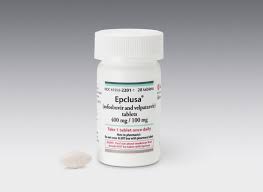FOSTER CITY, Calif.– Gilead Sciences, Inc. (Nasdaq: GILD) announced today that the U.S. Food and Drug Administration (FDA) has approved an expansion of the pediatric indication of Epclusa® (sofosbuvir/velpatasvir) for the treatment of chronic hepatitis C virus (HCV) to now include children as young as 3 years of age, regardless of HCV genotype or liver disease severity. The FDA approved a New Drug Application (NDA) for two strengths of an oral pellet formulation of Epclusa (sofosbuvir 200 mg/velpatasvir 50 mg and sofosbuvir 150 mg/velpatasvir 37.5 mg) developed for use by younger children who cannot swallow tablets. The recommended dosage of Epclusa in children ages 3 years and older is based on weight.
Treatment with Epclusa for 12 weeks was approved in patients without cirrhosis or with compensated cirrhosis (Child-Pugh A), and in combination with ribavirin (RBV) for patients with decompensated cirrhosis (Child-Pugh B or C). Sofosbuvir/velpatasvir is the only protease inhibitor-free, pangenotypic HCV regimen approved for patients as young as 3 years of age.
In the United States, as of 2018 there were approximately 35,300 to 60,500 children living with HCV and incidence has been on the rise. Mother-to-child transmission, the most common cause of HCV infection in children, increased 161% from 2009 to 2017, with intravenous drug use representing the primary driver of HCV infection among women of childbearing age.
“Gilead remains steadfast in our commitment to supporting HCV elimination. Today’s decision by the FDA represents important progress toward that goal by expanding more cure options for children living with HCV,” said Merdad Parsey, MD, PhD, Chief Medical Officer, Gilead Sciences. “This approval adds to the robust clinical evidence supporting the safety and efficacy of Epclusa across a broad set of patients, including those with end-stage renal disease and all stages of fibrosis.”
The approval of Epclusa for children as young as 3 years of age is based on data from a Phase 2, open-label clinical trial that enrolled 41 children 3 years to less than 6 years of age to be treated with Epclusa for 12 weeks. At 12 weeks after treatment completion, Epclusa achieved a sustained virologic response (SVR12) or cure rate of 83% (34/41) among all patients, 88% (28/32) in children with HCV genotype 1, 50% (3/6) in children with HCV genotype 2, and 100% in children with HCV genotype 3 (2/2) and HCV genotype 4 (1/1). Of the seven patients who did not achieve cure, all discontinued treatment within one to 20 days of starting treatment.
The safety profile of Epclusa in children 3 to less than 6 years of age treated was generally consistent with that observed in clinical trials in adults. Vomiting and product use issue (spitting up the drug) were reported in 15% and 10% of subjects, respectively; these adverse reactions were mild (Grade 1 or 2) and led to treatment discontinuation in 5 (12%) subjects.
Please see below for the U.S. Indication and Important Safety Information, including BOXED WARNING, for Epclusa.
“Treating pediatric HCV remains an important public health priority. The Phase 2 clinical trial results previously showed that this medication was effective in treating many HCV-infected patients, regardless of genotype,” said Karen Murray, MD, Chair of Cleveland Clinic Children’s and lead investigator of the pediatric study. “Now, the expanded approval and oral pellet formulation offer new treatment strategies in younger patients with HCV.”


